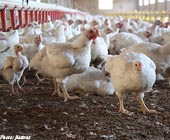 One of the problems of modern economy is that it often ignores the fact that economy should be an authentic expression of the culture of a people. Lose that element and something of the heart and soul of economy is lost.
One of the problems of modern economy is that it often ignores the fact that economy should be an authentic expression of the culture of a people. Lose that element and something of the heart and soul of economy is lost.
When there is a close interrelationship between producers, inhabitants, and the locality, an economy is an expression of culture. A person, community or nations can proudly point to the fact that they used their own resources to make products suited to their tastes and oriented toward the perfection of their society.
This can often be seen in food. For example, Mexican foods developed when cooks adapted local ingredients to the tastes of the people in the area. It was not born in a factory laboratory but rather is an organic expression of a culture and a place.
Indeed, today’s globalized commerce tends to separate, not unite, producers, consumers and places.
A striking example of this is a recent decision by the U.S. Department of Agriculture that will allow chickens born and raised in the United States, Canada and Chile to be processed in China and then sold in America. No country-of-origin labels will be required for this “intercontinental” chicken, so American consumers won’t know the when and where of the chicken they buy. There is no mandated inspection of Chinese chicken-processing facilities leading to speculation that local Chinese chicken and other substances might well find their way into soups and processed products.
Many have justly criticized the FDA’s ruling due to health and food safety concerns. China is notorious for avian influenza and food-borne diseases that have resulted in sickness and death. Environmentally, China has all sorts of dangerous chemicals that appear in water and food supply chains. There are human rights abuses and exploitative labor practices that raise moral questions involved in trade with China.
All of these are valid reasons to oppose “intercontinental” chicken. There is, however, another reason that must also be considered: “Intercontinental” chicken destroys culture.
The manner in which this chicken is shuttled across the globe is cold and impersonal, fast and frantic, mechanical and inflexible. What characterizes this chicken is not its distinctive taste but the fact that it is deliberately indistinctive.
In this world, there are no individual hens but only the shapeless mass of millions of birds collected from America, Canada and Chile. Producers must raise their poultry in huge numbers so they can be sent efficiently halfway around the world (and back) in giant refrigerated ships. The chickens are then turned into “chicken products” by being ground, flavored, breaded, shaped into nuggets, or added to soups.
Everything about “intercontinental” chicken speaks of bland soulless fare in which the lowest common denominator of quality is not only tolerated but desired. It also targets the widest range of consumers for whom taste or freshness are not primary concerns. Rather, convenience of use is highly prized for those who will eat this quickly prepared, overpriced chicken product in the midst of their fast-paced lifestyles
In the world of “intercontinental” foods, instead of a close interrelationship between producers, inhabitants, and locality, there is a far-flung network of production and distribution without anchors in community. These foods do not reflect a rich culture but a global anti-culture that suppresses individuality, and, like a giant machine, grinds down and levels everything to egalitarian sameness.
Gone are the distinctions around which people proudly unite to produce a common and rich culture. The French used to unite around their wines and cheeses. The Germans stood out for their beers and sausages. And so it was with countless peoples who used the ingredients found in their regions to develop foods that were expressions of excellence yet accessible to all the people
Today, bland sameness unites people. Things tend to be blended together in the name of a questionable efficiency and minimal cost. In the process, the heart and soul of economy is lost. Cheapness and superficiality reign.
 The important thing is not to reduce all economy to “intercontinental” chicken. It must be rejected, lest it help produce a similar society. As discussed in my book, Return to Order, what is needed is a return to order that unites economy and culture once again. The heart and soul of economy must be restored.
The important thing is not to reduce all economy to “intercontinental” chicken. It must be rejected, lest it help produce a similar society. As discussed in my book, Return to Order, what is needed is a return to order that unites economy and culture once again. The heart and soul of economy must be restored.
About John Horvat II
John Horvat II is a scholar, researcher, educator, international speaker and author of , “Return to Order: From A Frenzied Economy to An Organic Christian Society – Where We’ve Been, How We Got Here, and Where We Need to Go,” (www.ReturnToOrder.org). His writings have appeared worldwide, including in The Wall Street Journal, FOX News, The Christian Post, The Washington Times, ABC News and C-SPAN. For more than two decades he has been researching and writing about the socio-economic crisis in the United States.


